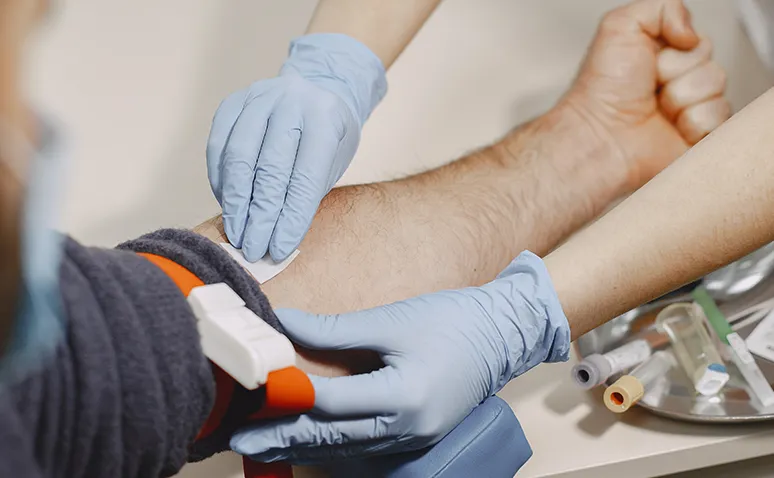What is a Cancer Marker Test? A cancer marker test is a diagnostic tool that measures biochemical indicators to determine the presence of cancer in the body or monitor the progression of the disease. These tests analyze proteins and other substances produced by cancer cells or secreted by the body in response to cancer. These markers are evaluated through blood, urine, or tissue samples. Cancer marker tests play a crucial role in early cancer detection, monitoring treatment response, and assessing the risk of recurrence.
What is a Cancer Marker Test? Cancer marker tests can be specific to certain types of cancer or used for general screening purposes. For example, PSA (Prostate-Specific Antigen) is commonly used for prostate cancer, CA-125 for ovarian cancer, and CEA (Carcinoembryonic Antigen) for colorectal and some other cancers. These tests help doctors track disease progression and develop appropriate treatment plans. However, elevated marker levels do not always indicate cancer, just as low levels do not necessarily rule out cancer. Therefore, healthcare professionals carefully interpret test results alongside the patient’s overall health status and other diagnostic methods.
How is a Cancer Marker Test Performed?
A cancer marker test is an essential diagnostic method used to detect the presence or progression of cancer in the body. These tests are designed to identify specific substances produced by cancer cells or those that increase in response to cancer. Since early detection significantly improves treatment success, incorporating these tests into regular health check-ups is highly recommended.
First, biochemical indicators called tumor markers are examined to investigate the presence of cancer. These markers may include proteins or metabolic byproducts produced by tumor cells. Most cancer marker tests work by measuring the levels of these substances in blood or urine samples.
A blood test is the most common method used to measure cancer markers. A healthcare professional collects a blood sample, which is sent to a laboratory for analysis. In some cases, urine or tissue samples may also be tested. However, a single blood test alone is not sufficient for a definitive diagnosis, and doctors typically complement it with additional diagnostic tests.
Some specific tumor markers are associated with particular types of cancer. For example, PSA testing is widely used for prostate cancer, while CA-125 is crucial for ovarian cancer screening. CEA levels may be elevated in cancers of the stomach, colon, and pancreas.

With advancements in technology, DNA testing and genetic analyses have become essential tools in cancer screening. By examining a person’s genetic structure, it is possible to determine their susceptibility to cancer and take preventive measures. Additionally, antigen tests are sometimes used to measure immune system responses and detect cancerous cells.
Who Should Get a Cancer Marker Test?
A cancer marker test is an important tool for early cancer detection, monitoring treatment progress, and assessing the risk of recurrence. However, it is not recommended as a routine test for everyone. It is primarily used for individuals in specific risk groups. People who want to assess their cancer risk and take preventive measures can undergo these tests upon their doctor’s recommendation.
Cancer marker tests are particularly recommended for the following groups:

-
- Individuals with a Family History of Cancer: Those with a family history of specific cancers may be at higher genetic risk. Regular screenings are particularly advised for hereditary cancers such as breast, prostate, colon, and ovarian cancer.
- Individuals with High Tobacco and Alcohol Consumption: Smoking and excessive alcohol intake increase the risk of lung, oral, throat, liver, and pancreatic cancer. For individuals in this category, marker tests can serve as an early warning system.
- Individuals with Symptoms: People experiencing unexplained weight loss, chronic fatigue, persistent pain, or abnormal lumps may undergo marker tests to aid in diagnosis.
- Individuals with a History of Cancer Treatment: Cancer survivors may need regular monitoring through marker tests to detect any recurrence.
- Certain Occupational Groups: People exposed to chemicals, radiation, or other environmental carcinogens may have a higher risk of developing cancer and should undergo periodic screening.
These tests should be evaluated alongside other medical examinations and should not be considered a standalone diagnostic tool. Regular health check-ups and lifestyle modifications are essential for cancer prevention and early detection.
What Are Cancer Markers?
Cancer markers are biological substances that help determine the presence of cancer, monitor disease progression, and evaluate treatment response. These substances include proteins, enzymes, hormones, or metabolic byproducts produced by cancer cells.
Some of the most commonly used cancer markers include:
- PSA (Prostate-Specific Antigen) for prostate cancer
- CA-125 for ovarian cancer
- CEA (Carcinoembryonic Antigen) for colon and stomach cancer
- AFP (Alpha-Fetoprotein) for liver cancer
- HER2 for breast cancer
However, these markers alone are not sufficient for a definitive diagnosis; they should be confirmed through biopsy, imaging techniques, and other laboratory tests.
How Can Cancer Be Detected in the Body?
Cancer detection involves evaluating various symptoms and medical tests. In its early stages, cancer may not cause noticeable symptoms. However, as it progresses, signs such as unexplained weight loss, chronic fatigue, non-healing wounds, blood in stool or urine, abnormal lumps, persistent pain, and skin changes may appear.
These symptoms vary depending on the type and location of the cancer. For a definitive diagnosis, doctors use methods such as:
- Blood tests
- Biopsy
- Magnetic resonance imaging (MRI)
- Computed tomography (CT scan)
- Positron emission tomography (PET scan)
Cancer marker tests play a supportive role in the diagnostic process. However, since they may yield false-positive or false-negative results, a doctor must carefully evaluate them alongside other diagnostic tools.











